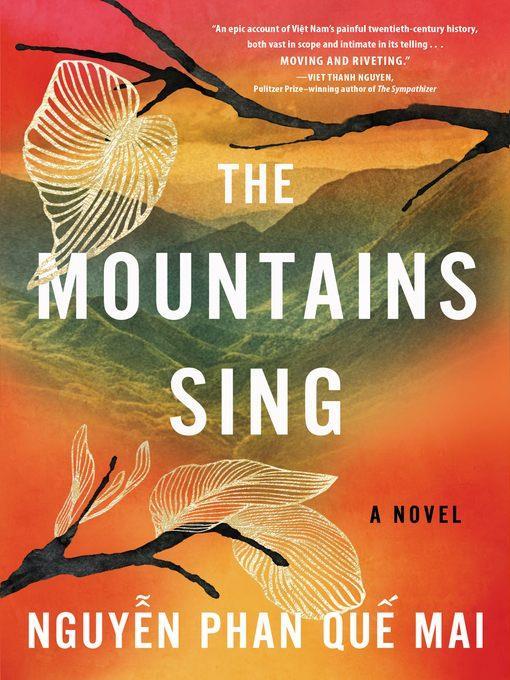
The Mountains Sing
فرمت کتاب
ebook
تاریخ انتشار
2020
نویسنده
Que Mai Phan Nguyenناشر
Algonquin Booksشابک
9781643750491
- اطلاعات
- نقد و بررسی
- دیدگاه کاربران
نقد و بررسی

Starred review from January 6, 2020
Nguyễn’s lyrical, sweeping debut novel (after the poetry collection The Secret of Hoa Sen) chronicles the Tran family through a century of war and renewal. As middle-aged writer Hương revisits her native Hanoi in 2012, she reflects on the lessons shared by her late grandmother Diệu Lan (“The challenges faced by Vietnamese people throughout history are as tall as the tallest mountains. If you stand too close, you won’t be able to see their peaks”) and chronicles their journey of survival during the Vietnam War. Hương was 12 when bombs encroached on Hanoi, where she lived with Diệu Lan after her mother, Ngọc, a physician, left to search for her father, a soldier in the NVA. After an evacuation to the mountains, Diệu Lan “opened the door of her childhood” to Huoung with stories of being raised by a wealthy family to pursue an education and resist old customs such as blackening her teeth. Diệu Lan also describes the harrowing truth of the Việt Minh Land Reform, during which her family’s land was seized in the spirit of resource distribution, encouraging her to question what she’s been taught in schools. Grandma and Hương return to Hanoi and find their house decimated, and Ngọc, who survived torture and rape while imprisoned by South Vietnamese soldiers, comes home without Hương’s father. In a subtle coda, Nguyễn brilliantly explores the boundary between what a writer shares with the world and what remains between family. This brilliant, unsparing love letter to Vietnam will move readers.

January 15, 2020
A sweeping tale of one family's shifting fortunes in Vietnam across half a century. The first novel in English by the Vietnam-born Nguyễn (The Secret of Hoa Sen: Poems, 2014) centers on the Trần family, living in North Vietnam during three conflict-struck generations. Her lens turns to two characters in particular: Diệu Lan, who grew up amid Japanese and French occupations, and her granddaughter Hương, who uses Diệu Lan's stories to try to piece together what happened during the war. It is a largely grim portrait. Diệu Lan watched as her father was beheaded by Japanese soldiers and saw the whole region suffer through a long famine; the six children who weren't killed during the war suffered PTSD or had their own children born dead, deformed from their parents' exposure to Agent Orange. The novel's major set piece and most effecting sequence follows Diệu Lan as she is stripped of her livelihood in the midst of Communist North Vietnam's "Land Reform" policy that demonized traders like herself; she's forced to abandon her children, one by one, to protect them from retribution. Her daughter (and Hương's mother) Ngọc, a doctor, survives the war, but comes home badly traumatized, and nobody knows where Hương's father is; the girl's sole tangible connection to him is a carved bird whose name gives the novel its title. For all the loss Nguyễn depicts, though, her story is invitingly and gracefully told. She is particularly adept at weaving in folktales and aphorisms to create a vivid sense of place. Hương's love for her homeland is complicated by her family's struggle and her refusal to see Americans as pure evil ("By reading their books, I saw the other side of them"), punctuated by a final twist that challenges her notions of love and family. The novel lapses into sentiment at times, but it mainly honors the complexity of its setting. A richly imagined story of severed bonds amid conflict.
COPYRIGHT(2020) Kirkus Reviews, ALL RIGHTS RESERVED.

February 1, 2020
A granddaughter and her grandmother take turns narrating. If our stories survive, we will not die, even when our bodies are no longer here on this earth. What emerges is the ominous history of twentieth-century Vietnam told through four generations of a single family. As a privileged 1930s teenager, Di?u Lan has a bright future overshadowed by a fortune teller's prescient warning of a very hard life. The tragedies begin with her father's gruesome murder by invading Japanese; her mother, husband, and brother also suffer separate, brutal deaths. Di?u Lan miraculously survives the mid-1940s famine of the Great Hunger and the savage 1950s Land Reform to raise her six children. Fast forward to the 1970s, when Di?u Lan is again doing everything possible to keep a loved one alive, this time her only granddaughter, Huong, whose parents and uncles are missing at war. Some will return, almost unrecognizably damaged, to continuing conflicts even at home. Widely published in Vietnamese, poet, nonfiction writer, and translator Nguy?n's first novel in English balances the unrelenting devastation of war with redemptive moments of surprising humanity.(Reprinted with permission of Booklist, copyright 2020, American Library Association.)




دیدگاه کاربران